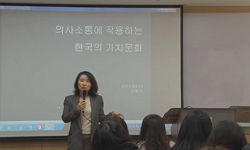Both China and South Korea belong to the confucian asia, thus there are many similarities in cultural aspects. However, there also exist several differences due to the differences in political system, economic development, ethnic and others. Since the...
http://chineseinput.net/에서 pinyin(병음)방식으로 중국어를 변환할 수 있습니다.
변환된 중국어를 복사하여 사용하시면 됩니다.
- 中文 을 입력하시려면 zhongwen을 입력하시고 space를누르시면됩니다.
- 北京 을 입력하시려면 beijing을 입력하시고 space를 누르시면 됩니다.

GLOBE 문화차원에서의 한국과 중국의 문화적 차이에 대한 비교연구 = A Comparative Study on the Cultural Differences between China and Korea: Focusing on the Cultural Dimensions of GLOBE
한글로보기https://www.riss.kr/link?id=A105045254
- 저자
- 발행기관
- 학술지명
- 권호사항
-
발행연도
2017
-
작성언어
Korean
-
주제어
Hofstede ; House ; GLOBE ; 비교문화 ; 문화적 차이 ; 중국문화 ; 한국문화 ; GLOBE ; Cultural difference ; China culture ; Korea culture
-
등재정보
KCI등재
-
자료형태
학술저널
-
수록면
87-107(21쪽)
-
KCI 피인용횟수
2
- 제공처
-
0
상세조회 -
0
다운로드
부가정보
다국어 초록 (Multilingual Abstract)
Both China and South Korea belong to the confucian asia, thus there are many similarities in cultural aspects. However, there also exist several differences due to the differences in political system, economic development, ethnic and others. Since these dissimilarities would be detrimental to co-operation between enterprises of China and South Korea, it is necessary to compare culture of China and South Korea. This research looks into whether there are cultural differences between China and South Korea, and whether cultural index of this research is different from GLOBE' findings. For cultural dimensions, this study uses GLOBE's questionnaire. As a result of one-way ANOVA, there are significant differences in the collectivism, power distance, humane orientation between China and South Korea. Performance orientation index of China and South Korea are both higher than GLOBE findings and future orientation index of South Korea is higher than GLOBE findings. Gender Egalitarianism of China and South Korea are both higher than GLOBE findings. Assertiveness of China is higher than GLOBE while assertiveness of South Korea is lower than GLOBE findings. Last, uncertainty avoidance level of China is decreased compared to GLOBE, while Korea’s uncertainty avoidance level is increased than GLOBE.
국문 초록 (Abstract)
문화에 대한 측정은 GLOBE 연구에서 개발한 도구를 사용하였다. 다변량 분산분석(MANOVA) 에 의해 분석을 실시한 결과 첫째, Hofstede와 House의 연구에서 공통으로 제시된 권력격차, 불확실성 회피, 남녀평등주의, 집단주의의 하위 문화차원을 중심으로 한국과 중국 집단 간 평가차이에서 양국 간의 유의적인 평가차이는 나타나지 않았다. 둘째, House 연구(GLOBE)에서 추가로 도출된 문화적 차원들을 중심으로 분석한 양국의 비교연구에서 성과지향주의, 인간지향주의 차원에서 중국과 한국 간에 유의적인 차이가 있는 것으로 나타났다. 성과지향주의은 중국이 높았고인간지향주의는 한국이 높은 것으로 나타났다.
중국과 한국은 같은 유교문화권 나라로서 문화적 유사점도 존재하지만 정치체계, 경제, 민족등으로 인해 상당한 문화점 차이점도 가지고 있다. 이러한 차이점은 양국 기업 간의 협력, 경영...
중국과 한국은 같은 유교문화권 나라로서 문화적 유사점도 존재하지만 정치체계, 경제, 민족등으로 인해 상당한 문화점 차이점도 가지고 있다. 이러한 차이점은 양국 기업 간의 협력, 경영관리 등에 영향을 미칠 것이다. 따라서 본 논문은 설문조사를 통해 GLOBE 연구에서 제시한 9개의문화척도에 있어 중국과 한국의 조직문화가 과연 차이가 있는지 또한 양국 문화에 대한 측정 결과가 비교문화 연구에서 가장 많이 사용했던 Hofstede와 GLOBE 연구 결과와 차이가 있는지를 측정하고자 하였다.
문화에 대한 측정은 GLOBE 연구에서 개발한 도구를 사용하였다. 다변량 분산분석(MANOVA) 에 의해 분석을 실시한 결과 첫째, Hofstede와 House의 연구에서 공통으로 제시된 권력격차, 불확실성 회피, 남녀평등주의, 집단주의의 하위 문화차원을 중심으로 한국과 중국 집단 간 평가차이에서 양국 간의 유의적인 평가차이는 나타나지 않았다. 둘째, House 연구(GLOBE)에서 추가로 도출된 문화적 차원들을 중심으로 분석한 양국의 비교연구에서 성과지향주의, 인간지향주의 차원에서 중국과 한국 간에 유의적인 차이가 있는 것으로 나타났다. 성과지향주의은 중국이 높았고인간지향주의는 한국이 높은 것으로 나타났다.
참고문헌 (Reference)
1 송광선, "한국기업의 연봉제 도입현황과 특성 및 이의 평가" 한국인적자원개발학회 1 (1): 33-57, 1999
2 신만수, "한국기업 종업원의 가치성향 분석 : 본사 및 해외자회사 비교" 12 (12): 1-31, 2001
3 이규만, "한·중 근로자의 가치관과 직무태도에 관한 비교 연구" 대한경영학회 19 (19): 1281-1306, 2006
4 장용선, "조직문화가 학습조직화에 미치는 영향: 금융산업을 대상으로" 한국경영교육학회 (62) : 147-180, 2010
5 심원술, "조직몰입의 선행변수에 관한 국가별 비교연구: 한국, 미국, 중국을 중심으로" 한국국제경영학회 15 (15): 1-34, 2004
6 심원술, "조직몰입에 대한 보편적 요인과 문화특수적 요인에 대한 실증 연구: 한국, 미국, 중국 종업원의 국가간 비교" 179-203, 2001
7 김보인, "아시아 국가들 간의 문화적 유사성과 차별성: 한국, 중국, 필리핀, 카자흐스탄 대학생 비교" 한국아시아학회 16 (16): 25-52, 2013
8 권종욱, "아시아 6개국 직무가치관의 동질성과 이질성 - 국가간 비교연구" 한국무역학회 38 (38): 47-68, 2013
9 김서균, "아시아 5개국 현지 근로자들의 직무가치 성향분석-G. Hofstede 5차원을 중심으로" 1 : 225-253, 2003
10 윤이흠, "불교의 여성관의 새로운 인식" (1) : 56-92, 1985
1 송광선, "한국기업의 연봉제 도입현황과 특성 및 이의 평가" 한국인적자원개발학회 1 (1): 33-57, 1999
2 신만수, "한국기업 종업원의 가치성향 분석 : 본사 및 해외자회사 비교" 12 (12): 1-31, 2001
3 이규만, "한·중 근로자의 가치관과 직무태도에 관한 비교 연구" 대한경영학회 19 (19): 1281-1306, 2006
4 장용선, "조직문화가 학습조직화에 미치는 영향: 금융산업을 대상으로" 한국경영교육학회 (62) : 147-180, 2010
5 심원술, "조직몰입의 선행변수에 관한 국가별 비교연구: 한국, 미국, 중국을 중심으로" 한국국제경영학회 15 (15): 1-34, 2004
6 심원술, "조직몰입에 대한 보편적 요인과 문화특수적 요인에 대한 실증 연구: 한국, 미국, 중국 종업원의 국가간 비교" 179-203, 2001
7 김보인, "아시아 국가들 간의 문화적 유사성과 차별성: 한국, 중국, 필리핀, 카자흐스탄 대학생 비교" 한국아시아학회 16 (16): 25-52, 2013
8 권종욱, "아시아 6개국 직무가치관의 동질성과 이질성 - 국가간 비교연구" 한국무역학회 38 (38): 47-68, 2013
9 김서균, "아시아 5개국 현지 근로자들의 직무가치 성향분석-G. Hofstede 5차원을 중심으로" 1 : 225-253, 2003
10 윤이흠, "불교의 여성관의 새로운 인식" (1) : 56-92, 1985
11 이광세, "동양과 서양 : 두 지평선의 융합" 길 1998
12 고병익, "동아시아사의 전통과 변용" 문학과 지성사 1996
13 김양호, "기업윤리의 구성요인과 조직유효성의 관계 및 조직문화 인식의 조절효과에 관한 연구" 한국경영교육학회 27 (27): 127-150, 2012
14 김홍규, "기업규모별 리더십, 조직문화 및 조직유효성의 인식에 관한 연구 - 중기업과 소기업을 중심으로" 한국경영교육학회 26 (26): 195-222, 2011
15 이도화, "국가문화 특성과 선호 리더십 유형 및 선호 보상제도의 관계: 한국과 중국 선원의 비교를 중심으로" 한국인적자원관리학회 (창간) : 5-26, 2000
16 韩菁, "简析韩国企业文化的特点" 38-39, 2002
17 石庆华, "国企业文化及其管理模式浅析" 45-47, 2000
18 金南顺, "中韩民族文化对员工行为模式影响的研究——基于大连中韩合资企业的调查" 5 : 91-95, 2011
19 亓名杰, "中日韩企业文化之比较" 58-63, 2007
20 Fang, T, "fritiqie of Hofstede’s Fifth national culture dimension" 3 (3): 347-368, 2003
21 Kluckhohn, F. R., "Variations in value orientations" Harper Collins 1961
22 Robertson, C. J., "The global dispersion og Chinese values : A Three-Country study of confucian dynamism" 40 : 253-268, 2001
23 Hofstede, G., "The Pitfall of Cross National Survey Research: A reply to the article by Spector et al. on the Psychometric Properties of the Hofstede Values Survey Module 1994" 51 (51): 170-178, 2002
24 Hofstede, G., "The Confucius connection : From cultural roots to economic growth" 16 (16): 4-21, 1988
25 McClelland, D. C., "Testing for competencies Rather than for Intelligence" 1973
26 Trompenaars F., "Riding the waves of culture" Irwin 1993
27 Chew, I. K. H., "Relationship on work-related values of Singaporean and Japanese managers in Singapore" 48 (48): 1149-1170, 1995
28 Mueller, S. L., "Political-economic context and sensitivity to equity: Differences between the United States and the transition economies of central and eastern Europe" 41 (41): 319-329, 1998
29 Hofstede, G., "Nationality and espoused values of managers" 61 : 140-155, 1976
30 Putnam, "Making democracy work" Proceton University Press 1993
31 House, R. J., "Leadership, Culture and Organizations: The Global study of 62 Societies" Sage 2004
32 Kuchinke, K. P., "Leadership and culture : Work-related values and leadership styles among one company's U. S and German telecommunication employees" 10 : 135-154, 1999
33 Triandis, H. C., "Individualism and collectivism" Westview 1995
34 Wang, "Handbook of industrial organizational Psychology, vol. 4" Consulting Psychologist press 689-725, 1993
35 Hofstede, G., "Culture’s consequences: International differences in work-related values" Sage 1980
36 Hofstede, G., "Cultures and organizations: Software of the mind" McGraw-Hill 1991
37 Hofstede, G., "Cultures and organizations: Software of the mind" McGraw-Hill 2004
38 Hofstede, G., "Culture's Consequences: Comparing Values, Behaviors,Institutions, and Organizations across Nations" Sage Publications 2001
39 Merritt, A., "Culture in the cockpit : Do Hofstede's dimensions replicate" 31 : 283-301, 2000
40 Heuer, M., "Cultural stability or change among managers in Indonesia?" 3 : 599-610, 1999
41 Javidan, M., "Cultural acumen for the global manager: Lessons from project GLOBE" 29 (29): 289-305, 2001
42 Kelly, L., "Congruence of national managerial Values and organizational practices: A case for the uniqueness of the Japanese" 10 : 185-199, 1995
43 Tu, Wei-Ming, "Confucian tradition in East Asian modernit" Hatvard University Press 1996
44 Schein, E. H., "Coming to a new awareness of organizational culture" 25 : 3-16, 1984
45 Kotter, J, "Cnrporate Culture and Performance" Free Press 1992
46 Redding, "Basic problems in crodd-cultural psychology" Swets & Zeitlinger B.V 338-343, 1976
47 Ali, "Advances in International Comparative Management, Vol. 3" JAI Press, Inc 151-170, 1988
48 Hofstede. G., "'The Cultural Relativity of Organizational Practices and Theories"" 1983
동일학술지(권/호) 다른 논문
-
- 경남대학교 산업경영연구소
- 서혜성
- 2017
- KCI등재
-
관광목적지 선택속성이 이미지, 방문의사에 미치는 영향- 미국인 쿠바 잠재관광객을 중심으로 -
- 경남대학교 산업경영연구소
- 장동석
- 2017
- KCI등재
-
호텔 종사원의 경력역량이 경력성공 및 기업성과에 미치는 영향 - 부산 L호텔을 중심으로 -
- 경남대학교 산업경영연구소
- 이준혁
- 2017
- KCI등재
-
협동조합 실태분석 및 정책실효성에 관한 연구 - 영남지역을 중심으로 -
- 경남대학교 산업경영연구소
- 윤지수
- 2017
- KCI등재
분석정보
인용정보 인용지수 설명보기
학술지 이력
| 연월일 | 이력구분 | 이력상세 | 등재구분 |
|---|---|---|---|
| 2027 | 평가예정 | 재인증평가 신청대상 (재인증) | |
| 2021-01-01 | 평가 | 등재학술지 유지 (재인증) |  |
| 2018-01-01 | 평가 | 등재학술지 유지 (등재유지) |  |
| 2015-01-01 | 평가 | 등재학술지 선정 (계속평가) |  |
| 2013-01-01 | 평가 | 등재후보학술지 유지 (기타) |  |
| 2011-01-01 | 평가 | 등재후보학술지 선정 (신규평가) |  |
학술지 인용정보
| 기준연도 | WOS-KCI 통합IF(2년) | KCIF(2년) | KCIF(3년) |
|---|---|---|---|
| 2016 | 1.07 | 1.07 | 1.01 |
| KCIF(4년) | KCIF(5년) | 중심성지수(3년) | 즉시성지수 |
| 0.93 | 0.86 | 0.915 | 0.22 |





 KCI
KCI






